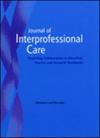Interprofessional education in traditional and complementary medicine: a scoping review.
IF 1.9
3区 医学
Q3 HEALTH CARE SCIENCES & SERVICES
引用次数: 0
Abstract
Interprofessional education (IPE) is a teaching method that improves collaboration and communication across health professions. There are consistent reports of poor interprofessional collaboration and communication between conventional health professionals and traditional and complementary medicine (TCM) professions. The application of IPE within courses that provide training in TCM requires close examination. This research aimed to identify the state of the art in IPE in TCM teaching. A scoping review was conducted. Thirteen databases were searched to identify citations up to March 2021. Thirty articles were selected after filtering for relevance against the inclusion criteria. The included articles were categorized into four a priori categories: Knowledge and Attitudes of students and professionals about TCM and IPE; Competencies of IPE in TCM; Teaching about TCM using IPE and Challenges and Opportunities for IPE in TCM. Nineteen of the included articles reported empirical research and primarily presented the evaluation of IPE activities within TCM courses or workshops; six studies consisted of texts with propositions and theoretical analyses; and five were case/experiential reports of IPE and TCM interventions, with or without evaluation of results. The studies report all health science students (undergraduate and graduate) exposed to IPE demonstrate a decrease in prejudice and an increase in knowledge about TCM. A sense of partnership developed through the collaborative competencies common to IPE and TCM and integrated care of patients. IPE in the context of TCM has been used for fostering integrative health care through the collaborative work of professional teams. Implementing IPE in TCM teaching requires inclusion in the curriculum, primarily undergraduate and research training.传统医学和辅助医学的跨专业教育:范围界定综述。
跨专业教育(IPE)是一种能改善医疗卫生专业间合作与交流的教学方法。不断有报告指出,传统医疗专业人员与传统和补充医学(中医)专业人员之间的跨专业合作与沟通不畅。在提供中医培训的课程中应用 IPE 需要仔细研究。本研究旨在确定中医教学中 IPE 的现状。研究进行了范围审查。对 13 个数据库进行了检索,以确定截至 2021 年 3 月的引文。根据纳入标准筛选出 30 篇相关文章。纳入的文章被分为四个先验类别:学生和专业人员对中医药和 IPE 的认识和态度;中医药 IPE 的能力;利用 IPE 讲授中医药知识;中医药 IPE 的挑战和机遇。收录的文章中有 19 篇报告了实证研究,主要介绍了对中医课程或讲习班中的 IPE 活动的评估;有 6 篇研究由带有命题和理论分析的文本组成;有 5 篇是关于 IPE 和中医干预措施的案例/经验报告,带有或不带有结果评估。这些研究报告显示,所有接触过IPE的健康科学专业学生(本科生和研究生)对中医的偏见有所减少,对中医的认识有所提高。通过 IPE 和中医共同的协作能力以及对病人的综合护理,建立了合作意识。在中医背景下,IPE 被用于通过专业团队的协作工作促进综合医疗保健。在中医教学中实施IPE需要纳入课程,主要是本科生和研究培训。
本文章由计算机程序翻译,如有差异,请以英文原文为准。
求助全文
约1分钟内获得全文
求助全文
来源期刊

Journal of Interprofessional Care
HEALTH CARE SCIENCES & SERVICES-
CiteScore
5.80
自引率
14.80%
发文量
124
审稿时长
6-12 weeks
期刊介绍:
The Journal of Interprofessional Care disseminates research and new developments in the field of interprofessional education and practice. We welcome contributions containing an explicit interprofessional focus, and involving a range of settings, professions, and fields. Areas of practice covered include primary, community and hospital care, health education and public health, and beyond health and social care into fields such as criminal justice and primary/elementary education. Papers introducing additional interprofessional views, for example, from a community development or environmental design perspective, are welcome. The Journal is disseminated internationally and encourages submissions from around the world.
 求助内容:
求助内容: 应助结果提醒方式:
应助结果提醒方式:


